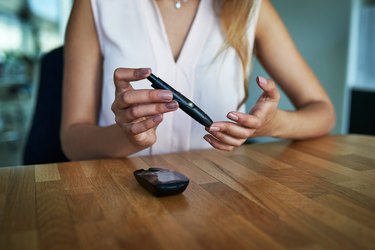
Non-fasting glucose levels can be a key measurement of any person's health, and regular blood sugar testing is an especially critical part of any diabetes care plan.
Here's what you should know about non-fasting blood work, including normal blood glucose levels.
Video of the Day
Video of the Day
Glucose 101
Blood sugar, or glucose, is one of the body's primary sources of fuel, which it mainly gets by metabolizing the carbohydrates in food. The hormone insulin helps move glucose out of the blood and into the cells.
But people with diabetes either don't make enough insulin or can't use the insulin their bodies do make effectively, according to the American Diabetes Association (ADA). This results in high blood sugar, or hyperglycemia. People with diabetes can also experience low blood sugar (hypoglycemia), especially if they are taking blood sugar-lowering medications like insulin.
A blood sugar level is simply a measurement of how much glucose is in the bloodstream at the moment you check. If you have diabetes, your doctor will help you determine how frequently you need to check your sugar level. According to the Mayo Clinic, people with diabetes may need to monitor their blood sugar anywhere from two to 10 times per day.
What Is Normal Non-Fasting Glucose?
Normal non-fasting blood sugar levels should be less than 180 milligrams per deciliter (mg/dL) for those with diabetes, according to the ADA. For those without diabetes, it's less than 140 mg/dL, according to Virginia Mason Diabetes Care.
Blood Sugar Before and After Meals
There are many different times of day when you can check your blood sugar, but the most important times are typically before and after a meal. Checking your blood sugar before a meal can help you decide which foods to eat and how much insulin to take. According to the ADA's Standards of Medical Care in Diabetes — 2019, a healthy blood sugar level before a meal should fall somewhere between 80 and 130 mg/dL.
Checking your blood sugar after you eat tells you how your body is processing your meal and whether or not you currently have enough insulin in your system. But don't check your blood sugar immediately after you finish your food. "If a patient wants to see their body's response to a meal, they need to wait two hours before checking blood glucose," says Samar Hafida, MD, an endocrinologist at Boston's Joslin Diabetes Center. "That's how long it takes for the body to fully digest carbs."
To see the effect of a meal on your blood glucose, measure your blood sugar two hours after starting your meal; that's when your blood sugar will peak. According to the ADA, the goal is that this peak, non-fasting glucose level will be less than 180 mg/dL.

Blood Sugar Levels at Night
It's also important to check your blood sugar before bedtime. According to the Joslin Diabetes Center, your before-bed blood sugar should be between 90 and 150 mg/dL. If your level is lower than this, you may need to have a small snack to prevent your blood sugar from falling too low overnight.
If you notice that your morning blood sugar levels are high, it may be due to something called the Somogyi effect, according to the Cleveland Clinic. This phenomenon occurs when blood sugar levels drop too low overnight, prompting the liver to release stored glucose to "rescue" you. If your doctor suspects that you are experiencing the Somogyi effect, he or she may ask you to check your blood sugar between 2 and 3 a.m. for several nights in a row. If your overnight sugars are indeed too low, your doctor will help you come up with a plan to manage the situation.
Read more: How to Quickly Reverse a Sugar Crash
When Should You Check Your Non-Fasting Glucose Levels?
Talk with your doctor about how often you need to check your blood sugar. Testing will depend on the type of diabetes medicine you take, as well as your overall glucose level (aka A1C level). If you're new to insulin, you'll likely have to check your blood sugar several times a day. Other people with diabetes may only need to check their levels a few times a week.
You might occasionally need to check your blood sugar at times unrelated to a meal or bedtime. For example, if your doctor has recently made a change to your diabetes medication, he or she may ask you to monitor your blood glucose more frequently throughout the day in order to gauge how well your new medications are working.
You may also experience elevated blood sugars when you're sick, as this can be part of the body's natural response to fighting an infection, according to the National Institutes of Health. If you have a cold, therefore, you might need to check your blood sugar levels more frequently. Blood glucose can also be elevated during pregnancy or times of stress.
If you experience the symptoms of hypoglycemia, check your blood sugar ASAP. This is the only way to actually confirm that it's low, according to the ADA.
It's not a good idea to check your blood sugar without a clear reason, however. "The meaningful data points provided by blood sugar readings are usually tied to a meal," Dr. Hafida explains. Checking blood sugar randomly — especially directly after a meal — can be misleading, and might cause you to adjust your medicine or carb intake incorrectly.
- American Diabetes Association: "Blood Sugar and Insulin at Work"
- Mayo Clinic: "Blood sugar testing: Why, when and how"
- MedlinePlus.gov: "Blood sugar test"
- American Diabetes Association:"Standards of Medical Care in Diabetes—2019" "
- Joslin Diabetes Center: "Avoiding Nighttime Lows"
- Cleveland Clinic: "Blood Sugar: Hidden Causes of High Blood Sugar Levels in the Morning"
- American Diabetes Association: "Hypoglycemia"
- National Institutes of Health: "Take Care of Your Diabetes During Sick Days & Special Times"
- American Diabetes Association: "The Big Picture: Checking Your Blood Glucose"
Is this an emergency? If you are experiencing serious medical symptoms, please see the National Library of Medicine’s list of signs you need emergency medical attention or call 911.